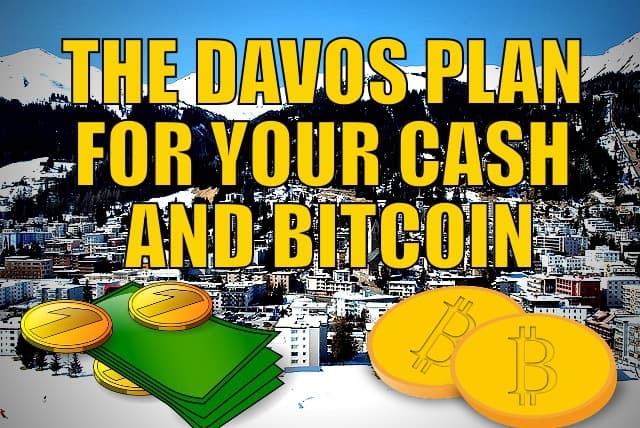We’ve been discussing the War on Cash a lot here recently. Many of the initiatives that are being slowly rolled out across the globe, such as removing higher denomination notes, have been hinted at by global elites over the past couple of years.
The central planner/global elitist gathering in Davos, Switzerland has been one such place where these initiatives are discussed. The gathering this year was no different. Read on to see what plans they have not just for your cash but for the cryptocurrency Bitcoin also…
The Davos Plan For Your Cash and Bitcoin
By Wendy McElroy – Originally posted on Bitcoin.com
An acceleration in the war on cash and a shift on bitcoin occurred in the wake of the January World Economic Forum (Davos) at which the world elites planned the economic rules under which the rest of us are meant to labor.
The Broad Framework
The war on cash is a war to eliminate physical money and drive all currency exchanges into the digital realm. For some bitcoin enthusiasts, this signals greater legitimacy and wider adoption. But for the war on cash to achieve the goals desired by states and central banks, the digital realm must be under state control and tightly monitored by authorities. Bitcoin, as a vehicle of personal freedom and independence, will be driven underground or gutted by regulation. To the extent it can, the EU will cripple its competitors – the free market and dissident individuals – even if it needs to co-opt internet access in the manner of an emerging nation.
Fortunately, the situation is chaotic, even within the EU proper. This is fortunate because decentralization – that is, the chaos of competing and independent alternatives – results in freedom and opportunity. While France and Spain go slap happy about capping cash transactions, Germany stands in strong opposition because roughly 80% of all its transactions are conducted in cash. While the European Commission talks of reigning in bitcoin to thwart terrorism and crime, average Italians flock to it as a protection against their government’s fiscal policies. Vigorous opposition exists.
Why then is there a sudden EU drive behind the cashless society and the centralization (regulation) of bitcoin?
Davos, June 2016
Sessions of the powerful are accompanied by public announcements which often reflect vague goals and non-binding commitments. Next to nothing is known about the private agreements that almost certainly occur between the global powerful who pitch their own interests. These specifics need to be teased out by events and policies that occur in the direct wake of Davos meetings. But two items long recognized as crucial by the Davos Men are the monetary crisis which verges on collapse, and that Fintech is the main competition to their mainstream system.
Nick Giambruno, among other influential economic forecasters, believes the June meeting had “huge historical significance” which developed behind closed doors. Giambruno, the Senior Editor of Casey Research’s International Man periodical, pointed to several indications of the historical direction, including:
• “Immediately after the conference, there was a big acceleration” toward a cashless society, beginning with the elimination of “high-denomination currency notes.” Publications such as Bloomberg and the Financial Times called for a cashless society. “A flood of articles from The New York Times, The Economist, Zero Hedge, and other publications picked up on this.”
• Only days after Davos, “the head of the Japanese central bank implemented negative interest rates for the first time ever.” He did so despite having repeatedly denied it would happen.
• Similarly, “the CEO of Deutsche Bank called for the elimination of cash. Norway’s biggest bank essentially did the same thing.”
• Academia fell in line. “Harvard put out a paper talking about the need to eliminate high-value paper currencies, like the $100 bill and the €500 note.”
The War on Cash, to which negative rates are integral, began to gallop.
Why are negative rates integral? Banks hold very little physical cash with most currency consisting of digits flowing through official computers. If people en masse demanded cash, there would be extensive bank runs and probably a collapse. If nothing but digital transfers existed, however, the runs would not occur. Moreover, banks could charge their trapped ‘customers’ a negative interest rate. That is, people would be compelled to pay a fee for maintaining an account. This would create a vicious circle. Rather than maintain $1,000 in an account that slices off $5 a month, people would have incentive to immediately spend their digital money on real goods and services with more static value.
Of course, each exchange – every penny earned, every book and head of lettuce purchased – would be seen by the state. The centralized funds could be easily taxed, frozen, confiscated, trapped within borders, and otherwise manipulated at will. The analysis of goods and services purchased could become a mainstay of social control.
But the brave new monetary world only works in the absence of viable currency and trade alternatives, such as physical cash, bitcoin, and barter. Authorities know this.
Davos, January 2017
Consider just two events that occurred directly after the latest Davos:
• “On the 23rd January 2017, the EU Commission issued the ‘Commission Initiative Roadmap’ for 2018 regarding the step up fight against the financing of terrorism, also known as its ‘Payments Restriction Initiative’ or…the cashless society.” (EU Steps Up The Pace For Cashless Society In 2017/18).
• January 28, a Bitcoin.com headline read “Bitcoin Powerhouse Bitfury Initiates Global Blockchain Business Council (GBBC) in Davos.” The Davos announcement stated, “The GBBC is meant to be a truly global body for the Blockchain and business ecosystems.”
If the GBBC is voluntary and does not benefit from government privileges that hobble its free market competitors, then no one can object any more than they can object to cashless systems that evolve naturally within the private sector. What are the odds?
An article entitled “EU Seeks Cash Limits in Push for Orwellian ‘Cashless Society’” (Feb.7) astutely comments; “Because a ban or limits on cash transactions would, if actually enforced, lead to people using alternative means to bypass Big Brother, the EU also anticipates the need for other assaults on other means of payment that allow privacy. “ In short, an assault on bitcoin and the like.
Conclusion
The world is a diverse maze of monetary practices, policies, and needs. The reality of cash and bitcoin use will differ dramatically from place to place depending on the specific circumstances. For individuals to prosper, rather than corporations and banks, however, the increasingly difficult trick will be to avoid regulation and the many traps that states will establish, such as Trojan horse blockchain networks.
One thing that should not be tricky is the response of the bitcoin community to an expanding state presence. Regulation should not be applauded as legitimacy; it should be recognized as a death threat to the personal freedom and flexibility that bitcoin promises.
And, yet, some bitcoiners will herald the state and global usurpation in the belief that it is credibility, not nationalization. Trading freedom for credibility is like trading freedom for security; it results in neither and damages both.
About the Author
Wendy McElroy
Wendy McElroy is a Canadian individualist anarchist and individualist feminist. She was a co-founder of the Voluntaryist magazine and modern movement in 1982, and has authored over a dozen books, scripted dozens of documentaries, worked several years for FOX News and written hundreds of articles in periodicals ranging from scholarly journals to Penthouse. She has been a vocal defender of WikiLeaks and its head Julian Assange.
Related content you might like to read: War on Cash – Implications for New Zealand
Gold vs Bitcoin/Cryptocurrencies – Which One Should You Choose?
You can now buy gold and silver with bitcoin. Check out this post to learn more about the pros and cons: How to Buy Gold and Silver with Bitcoin


